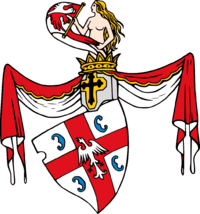Mrnjavčević family
| Mrnjavčević | |
|---|---|
 | |
| Country |
|
| Estates | Prilep |
| Founded | 1365 |
| Founder | Vukašin Mrnjavčević |
| Dissolution | 1395 |
| Ethnicity | Serb |
The Mrnjavčević family (Serbian: Мрњавчевићи, pronounced [mr̩̂ɲaːʋt͡ʃeʋit͡ɕ]) was a medieval Serbian noble house during the Serbian Empire, its fall, and the subsequent years when it held a region of present-day Macedonia region. The house ruled a province from its base at Prilep (in modern Republic of Macedonia) from 1366 to 1395.
Vukašin Mrnjavčević was a military commander in the army of Emperor Dušan the Mighty (r. 1331-1355) and co-ruler of Serbia as king, with Emperor Uroš the Weak (r. 1355-1371). After Uroš' death, the Serbian Empire crumbled, as the nobility could not agree on its rightful successor. Vukašin's son, Marko Kraljević, ruled his hereditary lands as titular King of Serbs and Greeks.
History
Origin
The family's progenitor, after whom historiography names it, was Mrnjava, a financial chancellor (kaznac, chamberlain) who served King Stefan Uroš I and his wife, Queen Helen of Anjou at the court at Trebinje (in Travunia).[1] According to Ragusan historian Mavro Orbin (1563–1610) wrote that the family hailed from Hum, and that the poor Mrnjava and his two sons, who later lived in Blagaj,[2] quickly rose to prominence under King Stefan Dušan. Possibly, the family had left Hum, which had been part of the Serbian Kingdom, after the Bosnian conquest of Hum (1326), and settled in Livno (where Vukašin was allegedly born).[1] The family most likely supported Dušan's Bosnian campaign (1350), in which he saw to reconquer Hum.[1]
Family tree
- Mrnjava (fl. 1280–89), a treasurer of Queen Helen of Anjou
- Vukašin (1320–1371), King and Lord of the Serbian and Greek Lands, and of the Western Provinces (1366–71)
- Jovan Uglješa (1320s–1371), despot, ruler of Serres (1356–71)
- Tvrtko
- Uglješa
- Eupraxia
- Gojko (fl. 1355–71), logotet
See also
References
Sources
- Рудић, Срђан (2001). "О првом помену презимена Мрњавчевић" (PDF). Историјски часопис (48): 89–97.
- Aleksa Ivić; Dušan Mrđenović; Dušan Spasić; Aleksandar Palavestra (1987). Rodoslovne tablice i grbovi srpskih dinastija i vlastele. Belgrade: Nova knjiga.